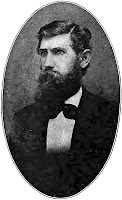Joe Herring Jr. is a Kerrville native who is amazed at the historical materials readily available — for free — online. This column originally appeared in the Kerrville Daily Times May 12, 2012.
Joe is our favorite Kerrville historian!
Since Saturday was an election day in the City of Kerrville, where we elected a mayor and two members of the city council, I thought I’d share the story of Kerrville’s fifth mayor, Dr. George Robins Parsons, who once lived beside our print shop on Water Street.
He’s interesting for several reasons: he was a pioneer physician here, he built the first sanatorium for tuberculosis patients, and he operated a stage line. But most importantly for the history of our community, he wrote far and wide about the health benefits of living in Kerrville, especially for those suffering from tuberculosis.
Many prominent Kerrville families can trace their history to a family member who contracted tuberculosis and moved to the hill country “seeking health.” Our community’s story would be much poorer if it hadn’t been for these families. Florence Butt came here with her family because her husband Charles (and later her son, Charles) were stricken with the illness. She later started a little grocery store that’s enjoyed some success. J. E. Grinstead, the newspaperman who coined the phrase “The Texas Hill Country,” came here because his first wife was ill. Even Jimmie Rodgers, the “father of country music,” came here for the same reason.
But why did they all choose Kerrville?
I think it might be, at least in part, because of the efforts of Dr. Parsons.
Consider this, from an article he wrote for the “Southern Journal of Homeopathy” in June, 1892:
“…through a series of unfavorable circumstances, I was attacked with serious hemorrhages of the lungs in 1875, and rapidly broke down in health.” A change in climate from his native Illinois was recommend by his doctors.
“Upon advice of Dr. T. C. Duncan, then editor of the “Medical Investigator,” I directed my steps toward San Antonio. Upon an examination of my lungs the doctors in that city shook their heads and told me they thought I had come too late.”
One doctor, a Dr. Fisher, “had just returned from an extensive outing in the Health Belt…and recommended Kerrville.”
“Acting upon his advice I boarded a freight wagon at San Antonio, the only means of getting there in those days, and to Kerrville I came. I shall never forget the loneliness of that ride, nor the impressions made upon my mind by the realization of the fact that I was going away off from rail and telegraph communication with friends in the north, perhaps to die among strangers in a strange and frontier land. But here I came and here I have been ever since and here I am and here I expect to be until I die. A good many of my Kerrville friends well remember to this day their first meeting with the young doctor from the north with his silk plug hat and his regulation black coat, all of which were strange to this country at that time, and all of which gave me the appearance of a walking cadaver. Many were the sympathies expressed on all sides for the poor fellow, and many were the condemnations of the doctor who had sent him here…[I] was emaciated to a skeleton, and every one I came in contact with expected me to see me a charge upon the county.”
Dr. Parsons regained his health, and eventually his family joined him here.
In the rest of the article he praised the climate of Kerrville and urged others suffering from tuberculosis to join him here. He built the first sanatorium for tuberculosis patients near the corner of Water and Sidney Baker streets; others would follow.
“The wonderful rapidity with which this climate is being brought into notice is beyond comprehending, as the thousands who are benefited are preaching it to the world,” he wrote.
He had served in the Union Army during the Civil War, and was severely wounded in the Battle of Seminary Ridge. After the war he studied medicine in Chicago.
“Although a Republican in politics and a northerner, and living in a southern and Democratic community, he enjoyed the confidence of all and was for seven years mayor of Kerrville, where he died, November 27, 1893.”
Joe Herring Jr. is a Kerrville native who is amazed at the historical materials readily available — for free — online. This column originally appeared in the Kerrville Daily Times May 12, 2012.

